Rules
You are an adventurer in a world of magic and danger
Quest is a game that creates a fantastic story. The rules help you imagine what happens. You’ll create a unique character, then say what they do. You can seek treasure, glory, justice, revenge, or anything you want. The possibilities are endless.
You can play Quest to make a short story in one session, or for an epic adventure that lasts for months or years. You can’t lose the game, but everyone wins if you tell a memorable story and have a good time.
Here you can learn the basic rules of Quest, which you can also find in Chapter 1 of our
Listen to this page
Join our narrator, The Guide, and two adventurers as they explore the first chapter of our Game Book.
The Basics
Quest works best with 4-6 players. One person plays as The Guide, which is the story’s narrator. Everyone else will create one of the story’s main characters, and then play as the character they created. These player characters are allies in an adventuring group called the party.
Stuff the Guide does:
- Imagine the people, places, and things the party encounters
- Describe what the players sense, and what happens
- Plays the part of the non-player characters, like townspeople, monsters, and bosses
- Imagines the consequences for the party’s actions
Stuff the party does:
- Imagine what their characters think, feel, and do
- Play their roles and explore their characters’ personalities
- Work together to solve problems and advance the story
Stuff You Need
Each player needs the Quest Game Book, a few hours of free time, a place to meet, a 20-sided die, and something for taking notes. You’ll also need the Quest Game Book, a character profile, a character worksheet, and an open mind.
It’s also nice to have a quiet room and some snacks and drinks.
How to Play
You play the game by having a conversation with your friends that begins like this:
First, the Guide describes your scene to help you imagine the world and what is happening. Next, you say what your character does. You can do anything you want, like talk to other characters, attack, or use one of your special abilities. Then, the Guide imagines what happens next and describes the scene again.
The Guide
You feel a light breeze on your skin as you walk through the forest. The trees begin to rustle gently, but then you feel the earth rumble beneath you. Birds jump from the canopy and flee the forest. Suddenly, a giant bear bursts through the trees! As she looks down at you, you notice something strange. She’s wearing armor and has an axe at her side. What do you do?
Harper, the party’s Magician
Oh wow. I’m startled and reach for my sword, but when I see the bear is wearing clothes, I calm down a little bit. I want to talk to her. I look through my bag and pull out a granola bar and give it to her.
The Guide
The bear sniffs the air in your direction and smiles. She takes the granola bar from you and munches on it. After licking her lips, she rolls backward and sits upright. “My name is Claw,” she says. “I am the protector of this forest.”
Harper, the party’s Magician
Um, yes, Claw rules. I want to be her friend.
Scenes
Explore each scene for clues
You might find yourself in a bustling bazaar, a castle in the clouds, or a dark dungeon. Use what you sense in each scene to help you decide what to do. If there’s grease on the ground, you might slip on it. If a monster is three times your size, it might be able to pick you up. If the sky is dark, a storm may be coming.
Felix, the party’s Fighter
What does it smell like in here?
The Guide
It smells like a thousand blooming flowers on the first day of spring.
Always think about the details the Guide gives you, and ask for more if you need it. You can start by asking what you sense, like “What does it smell like in here?” Or, you can ask something more specific, like “Do I see anything I can set on fire?”
Harper
Ooh… do I see anything I can set on fire?
The Guide
As a matter of fact, there’s a giant cloth banner hanging behind the throne that goes from the floor to the ceiling.
How to do Things
Once you know what you want to do in the story, doing it is simple.
All you have to do is say what your character does. If you want to open a door, say that you open it. If you want to talk to another character, start talking to them.
See a good dog? Say “I pet the dog.”
Harper
Who’s a good boy?
You can play your role by speaking both as your character’s narrator and actor.
You can narrate by telling the group what your character is doing.
You might describe how your character moves across a room, or what their facial expressions look like when they react to something. Or, you might describe how something makes them feel.
Felix
Felix feels sad that he was picked last for the mission. He walks over to the corner with his head down and pouts.
You can also step into your character’s shoes and speak their lines.
When you speak as your character, it’s like being their actor in a movie. You can talk to your companions this way, or any other character you encounter in the game.
Harper
Hey Felix, listen to me. You’re in this party for a reason. I need your help if we’re going to make it.
Felix
Thanks, Harper. It means a lot that you believe in me.
What to do
This game is about imagining scenes in a fantasy world, then deciding how your character responds to them. You can do anything in Quest, but here are some things you might do often.
You can investigate the scene by asking questions to the Guide:
Harper
How many fangs do I see in the monster’s mouth?
Guide
Harper can’t count that high.
Harper
Uh ohhhhh.
Describe how your character feels, or say what they’re thinking:
Harper
I don’t think we’re prepared for that many fangs. Harper thinks we should retreat.
Talk to your fellow party members, or any NPCs you meet:
Felix
This is my moment, Harp. I’m not throwing away my shot.
Make attacks on your adversaries with your weapons:
Felix
Okay, I’m going to take out my sword and charge in.
Guide
Nice! The monster’s eyes open wide. It wasn’t expecting you to do that.
Use your special abilities.
Harper
Harper is so proud of Felix. She’s going to cast her Fear spell on the monster to try to make it run away.
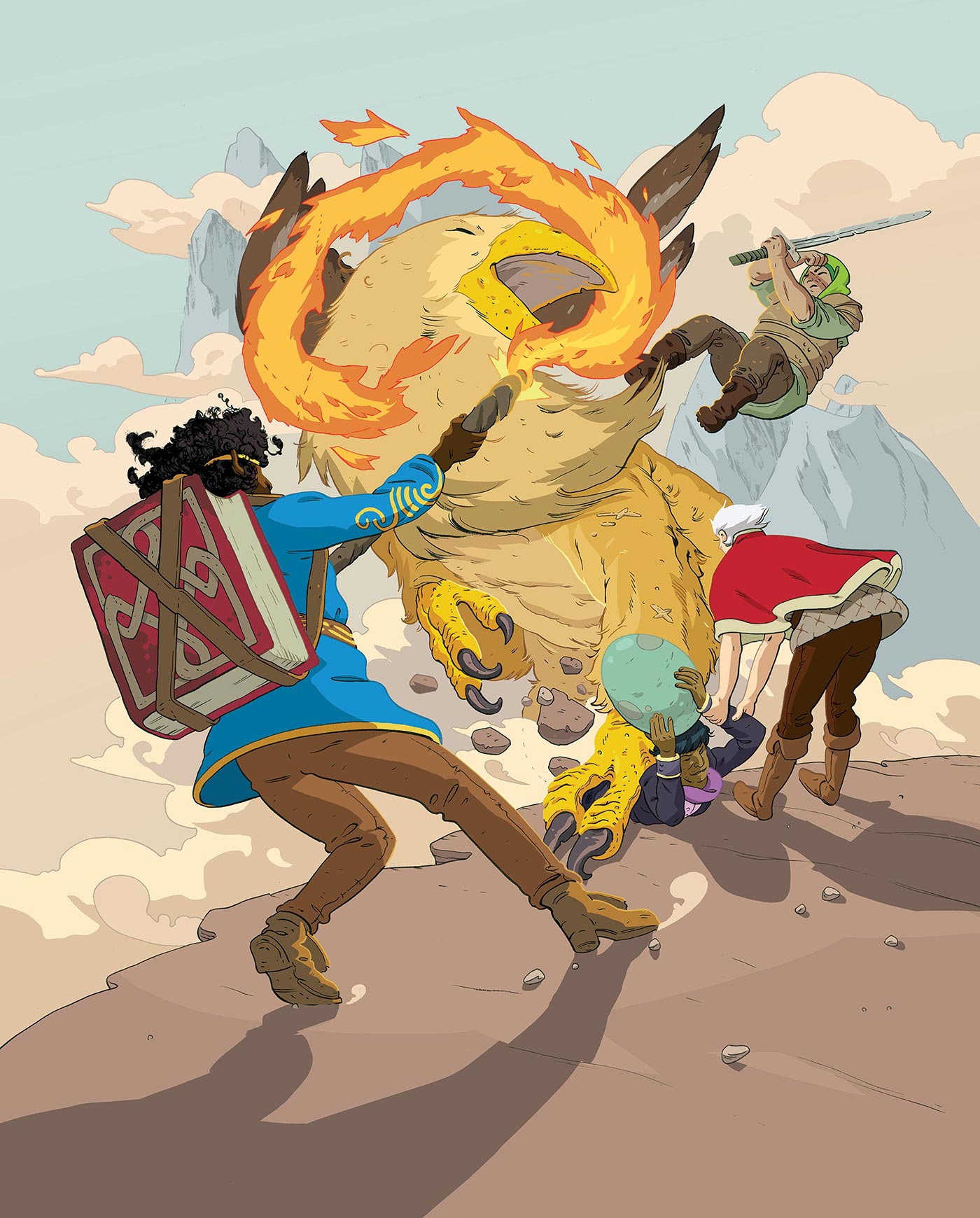
Action Scenes
Move and act during a turn
Usually, the action in the game will flow freely while players speak, act, and think about what to do next. But in an action scene, the players take turns. During a turn, your character can move around and do one thing. Your one thing can be a special ability you have or something else you imagine, like helping a friend to their feet, attacking an enemy, or trying to break through a door.
The Guide decides whose turn it is based on what's happening in the story. They'll call on you when it's your turn. When each member of the party has taken a turn, the party has completed a round. Then, the Guide gets a round of turns for all of the creatures they control.
Distances
Picture this: it’s your turn, and you see a mischievous monster. So you ask the Guide if it’s possible for you to hit it.
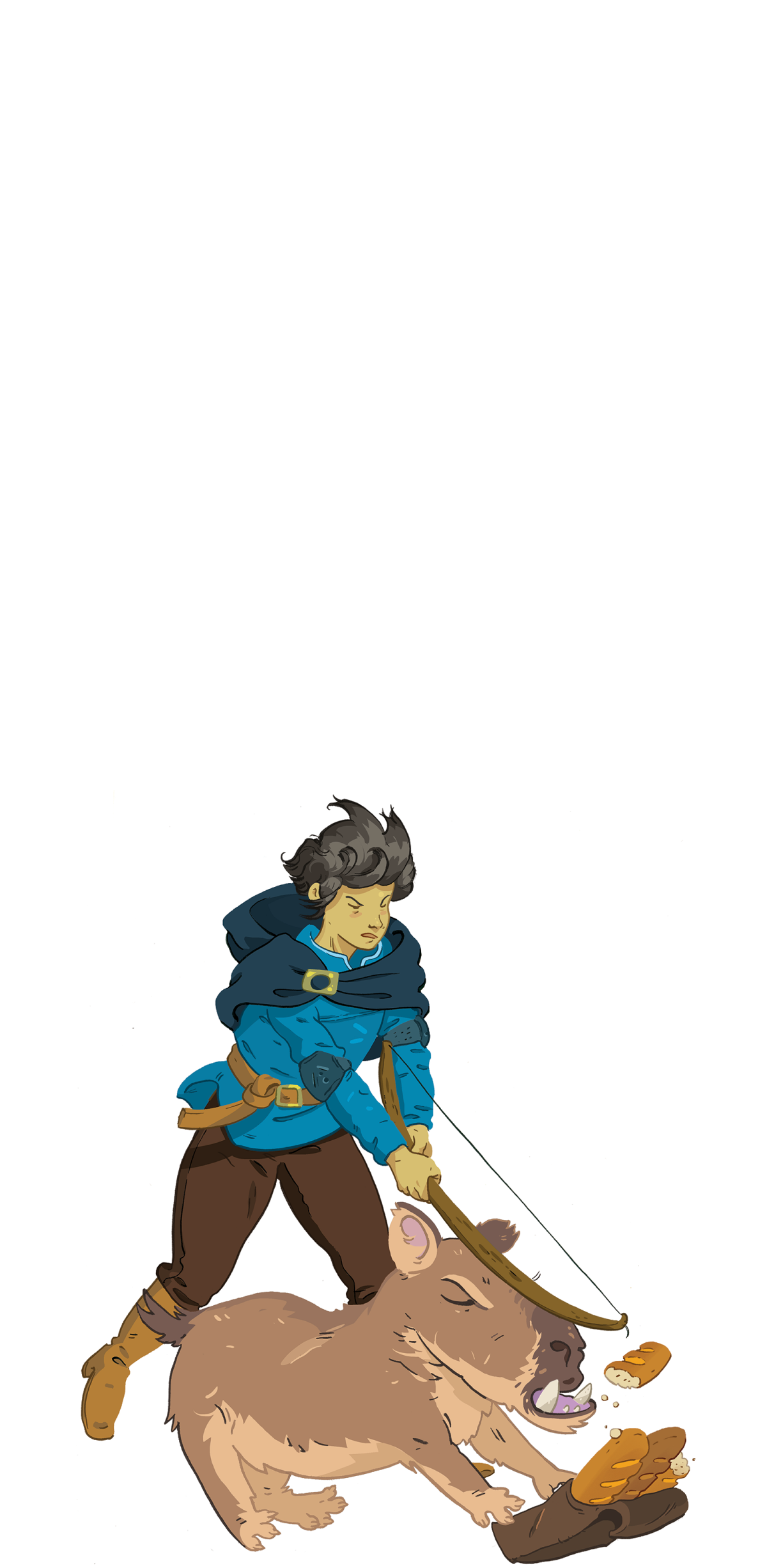
In Reach
If the monster is in reach, you can touch or hit it from where you stand.
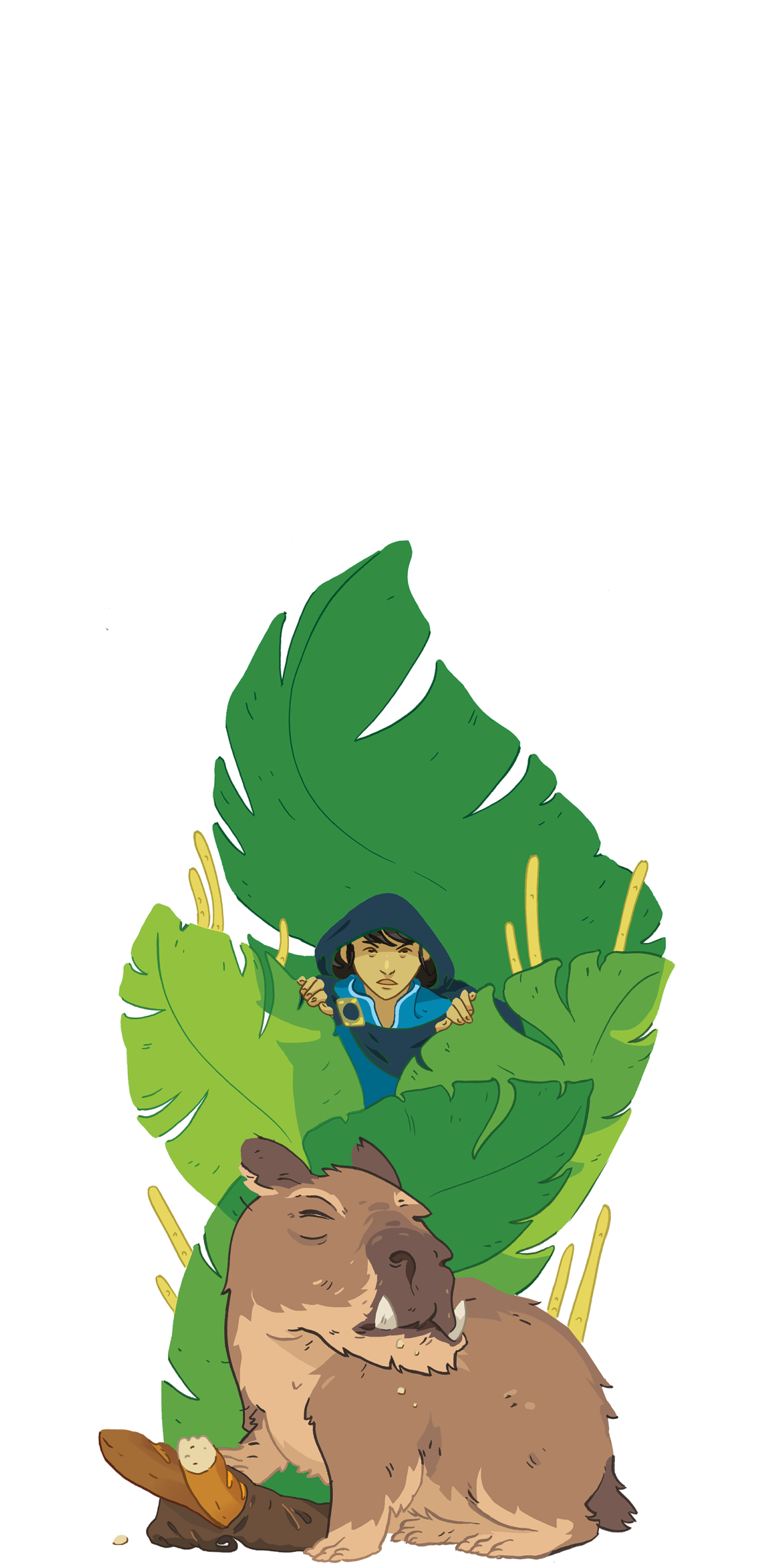
Nearby
If the monster is nearby, you can move to be within reach of it during your turn.
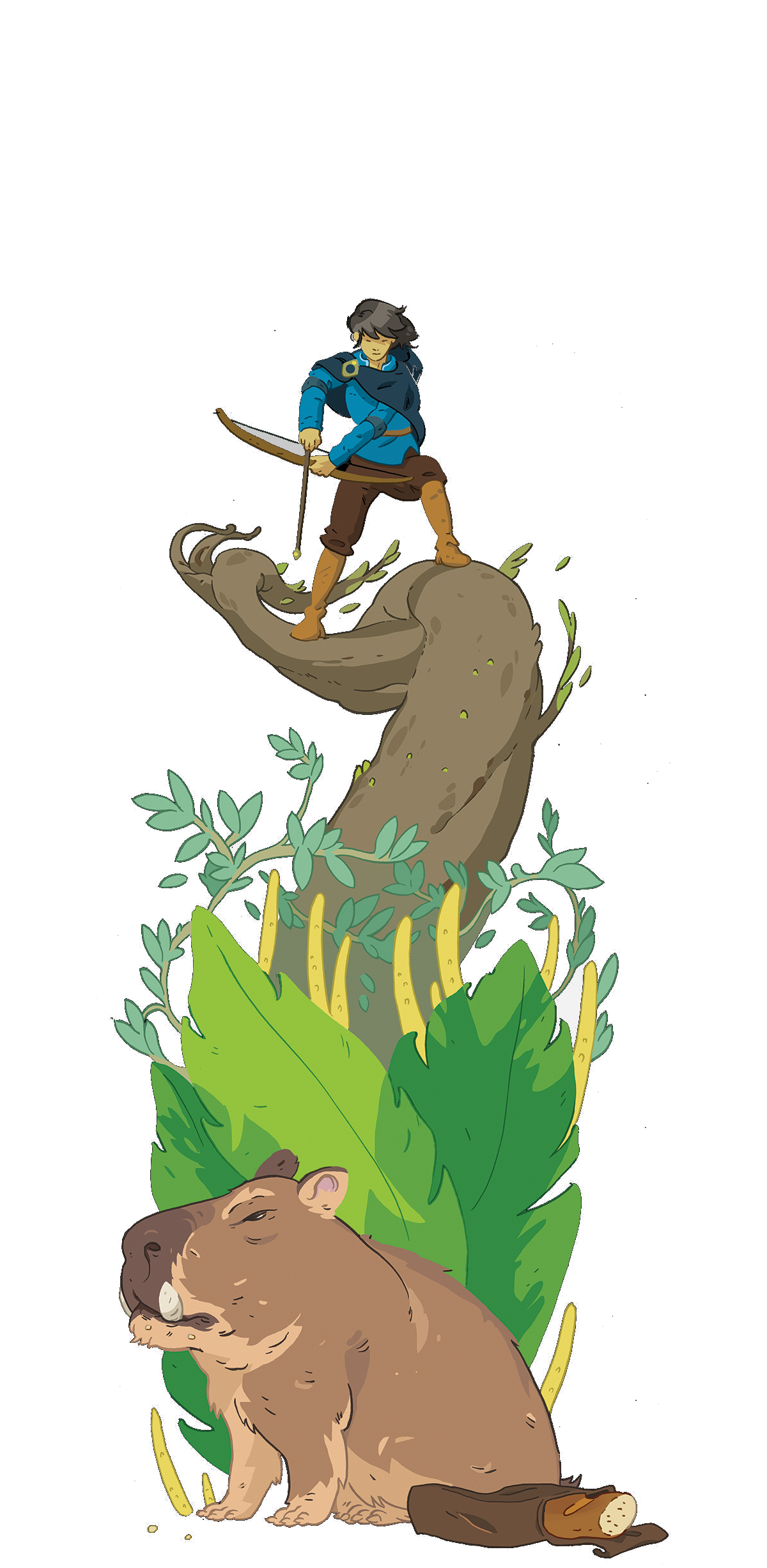
In Range
If the monster is in range, you can hit it with a ranged attack this turn.
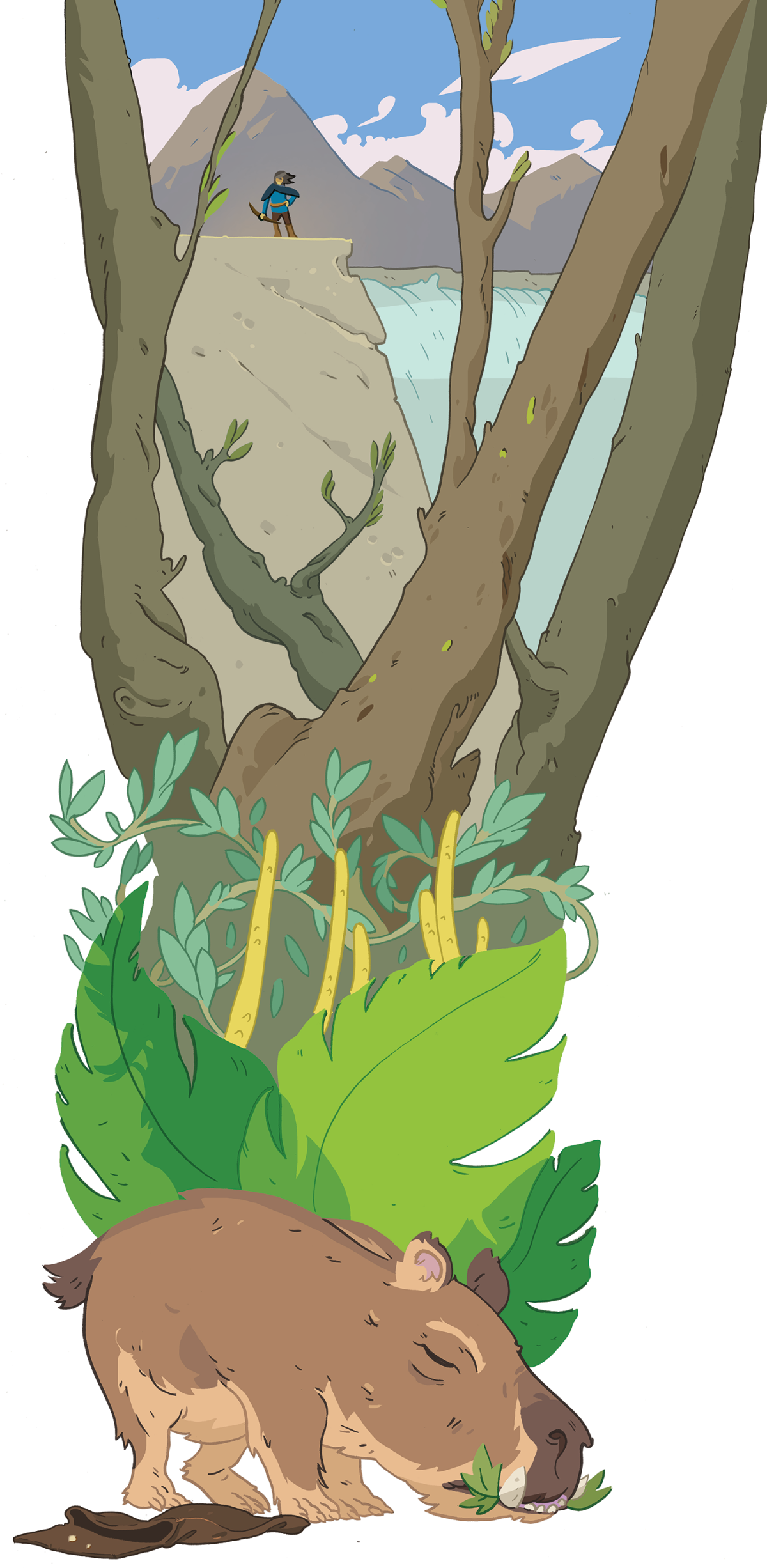
Too Far
If the monster is too far, it’s beyond your range this turn. You’ll have to get closer.
Rolling the Die
Roll the die to test your luck
You roll the die in Quest to let fate decide what happens next. The Guide will ask you to roll when you try to do something risky, or when a bit of chance makes things fun.
After you roll, look at the number on top of the die. Then compare the result to the list of outcomes below. The Guide decides what the consequences are.
You may find fortune! But if things go badly, you will suffer a setback. You might lose your belongings, accidentally harm a friend, or face a painful choice.
20
Triumph
This is an exciting moment. You automatically succeed at what you were trying to do, and you may even find added fortune. If you’re dealing damage, double it.
11-19
Success
You accomplish what you were trying to do without any compromises. If you’re dealing damage, you deal the standard amount.
6-10
Tough Choice
You succeed in your action, but there’s a cost. The Guide will give you a choice between two setbacks.
2-5
Failure
You fail your intended action and face a setback of the Guide’s choice. You might lose equipment, take damage from an enemy counterattack, or face some other misfortune.
1
Catastrophe
Oh no. You automatically fail, and you may suffer a severe setback.
Guide
Okay, roll the die to see if you strike the monster.
Felix
YES. That’s a 20.
Harper
yessssss
Guide
You smack the monster right in the face with the side of your sword. It spits out several fangs. It’s so surprised by your bravery that it turns and runs away deeper into the cave!
Deadly Scenes
Don’t run out of hit points
Your character’s mortality is measured by a number called hit points, or HP. It’s simple: you lose hit points when you are harmed, like if you get stuck by a sword. We also call this damage.
You lose hit points when you are damaged by weapons, spells, and other things that can cause harm. For example, you can lose 2 HP from being hit by a sword, while standing in a dragon’s fiery breath might damage you for 6 HP. You begin with 10 HP. This is the maximum amount of HP you can have.
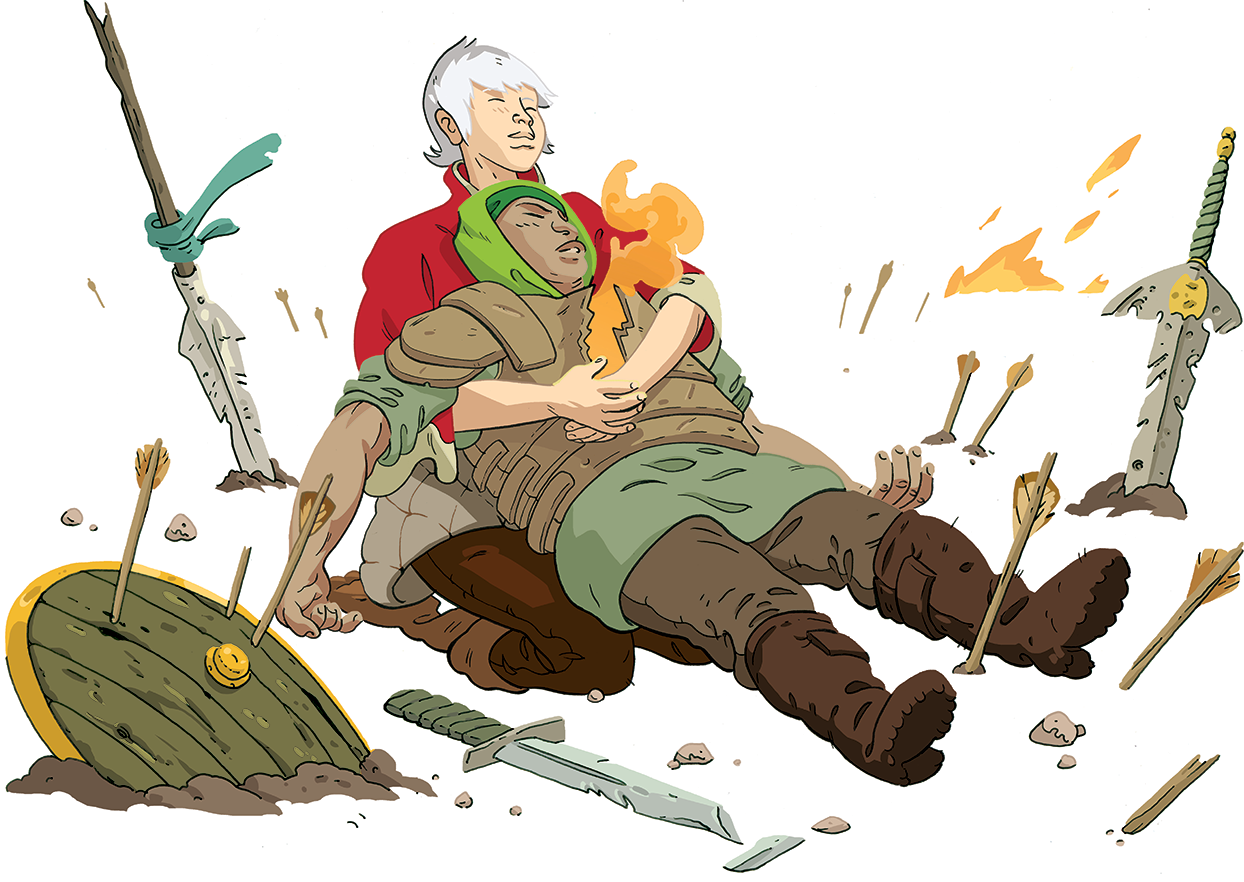
Guide
You hear a loud rumbling sound and look behind you. A giant boulder is rolling through the cave toward you! Felix, roll the die to see if you can dodge it.
Felix
Oh no. I rolled a 2. That’s a failure.
Guide
Ouch. Yeah, you try to dive out of the way into a nook in the wall but you’re just a moment too late, and the boulder knocks you aside. You take 3 damage.
You can regain up to half of your total hit points by resting for a short time with no enemies nearby, and you can recover all of your hit points by completing a full night’s rest.
You can’t be seriously hurt until you run out of hit points. You can’t be seriously hurt until you run out of hit points. But when you drop to 0 HP, you are at death’s door. You can’t go below 0 HP, but you will remain there until you regroup, rest, or heal. If you are hit while you are already at 0 HP, roll the die. If the result is equal to or less than the hit, your character dies. For example, if a sword hits you for 2 HP while at death’s door, you are killed if you roll a 1 or a 2.
Abilities
Find your power
With the
You begin the game with six abilities from the Ability Catalog. At the end of each play session, you can learn one new ability for your role that you can use the next time you play.
Some of your abilities are so powerful and taxing that you can only use them occasionally. To use these abilities, you will spend Adventure Points (AP). You begin the game with 10 AP, and earn more while you play and at the end of each session.
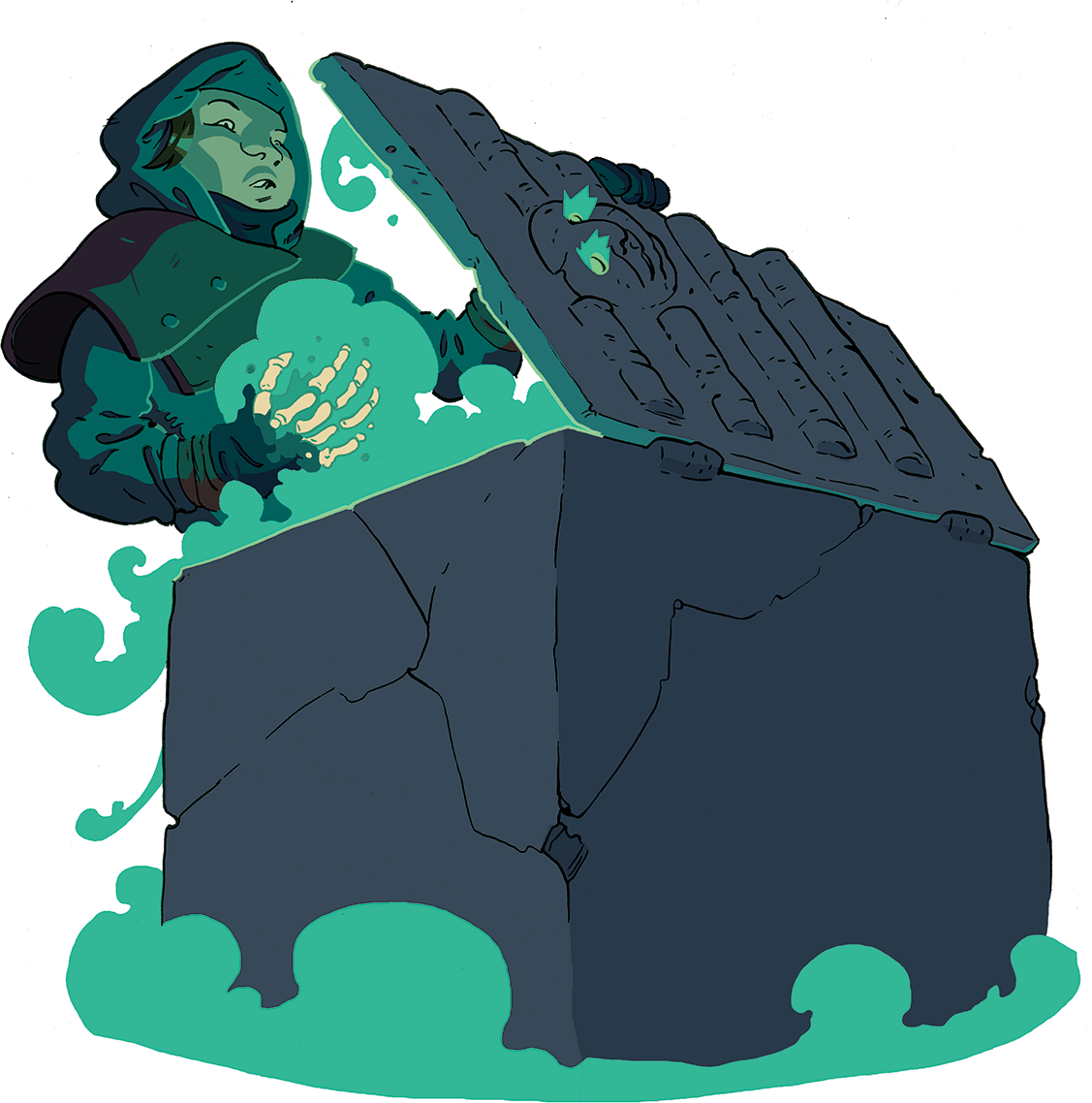
Trade & Inventory
Receive what you need, trade for things you want
Quest doesn’t use money. You can meet your basic needs in Quest without having to pay for them. This includes things like food and drink, a modest dwelling, and inexpensive items, like the things that stock the shelves of a convenience store. But if you want something valuable, like a shiny sword from a merchant or a room in a fancy hotel, you might have to trade one of your own valuable possessions for it.
You can use your character worksheet to track your personal inventory. Your character can only personally carry a total of 12 things, and The Guide will decide what counts against this limit.
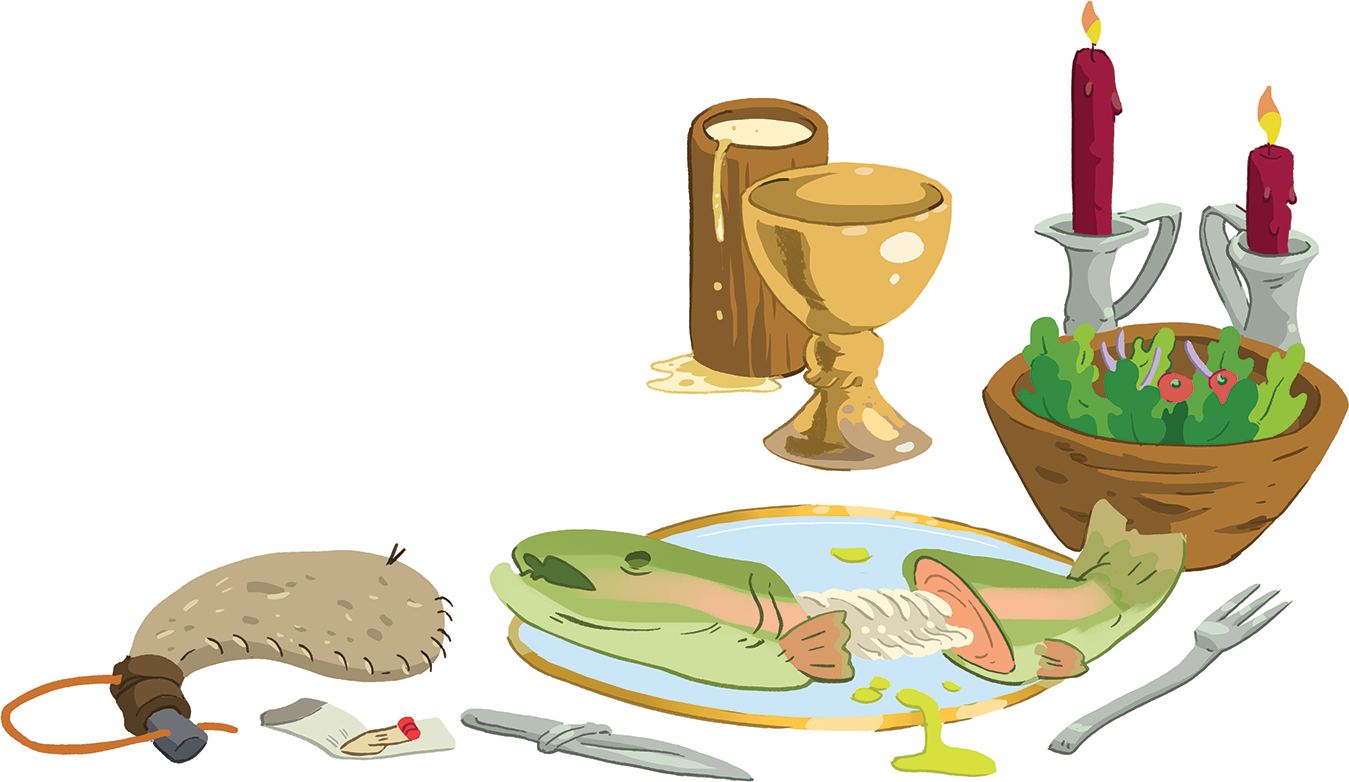
General Rules
Be good to each other
Quest works best when people treat each other and the conversation with mutual respect. Which is to say: be nice at the table, even if your character is mean sometimes.
The game doesn’t work when people are angry, rude, or uninterested in what’s going on. In the real world outside of the game, everyone deserves to be treated with respect. When you decide to spend your time sharing a story together, you should do your best to make sure everyone has a good time.
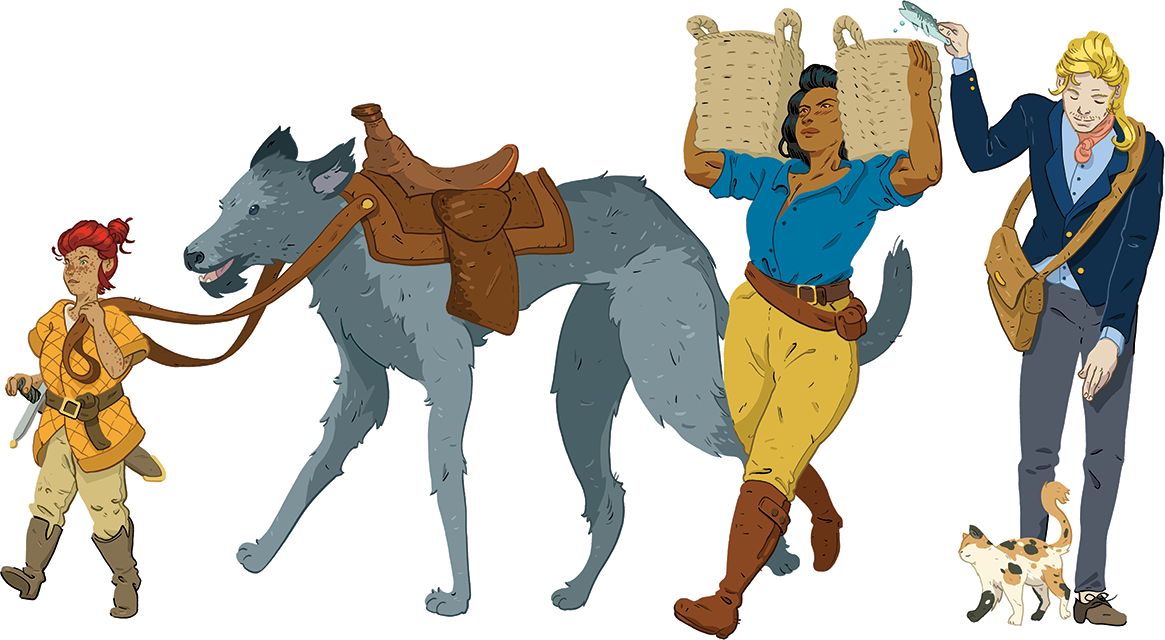
Respect Personal Boundaries
Don’t say things to people either out of character or in roleplaying that make them uncomfortable in the real world. Don’t introduce extreme concepts into the game, like torture or sexual violence, unless everyone agrees beforehand that they are acceptable to use in your story. (If you have any doubts about subject matter, it’s probably best to leave it out.)
Let Your Friends Talk
Everyone should get a chance to speak without being interrupted. Make sure you are not dominating all of the conversation or action. Share the story.
Only Play Your Character
Don’t tell other people what to do, even if you think you have the best idea. You can’t win or lose a game of Quest in the traditional sense. People are often supposed to fail or do silly things, especially if they are roleplaying.
Be Nice to Your Guide
It takes a lot of work to prepare for the game and keep it running over time. Show respect for your Guide by paying attention when they are helping tell the story. It can feel hurtful when people are distracted.
Since the Guide is bringing lots of work to the table, it’s a nice gesture for the players to take turns providing things like snacks and drinks for the group.
Silence Your Phone
Please.
Ask for Consent
It is against the rules for player characters to attack other party members, steal from them, restrain them, or force them to do anything against their wishes. If you want to roleplay an adversarial situation, go out of character to ask the other player if it’s okay.
Don’t be Evil, Unless…
The players’ objectives should be compatible because they are allies. The game can quickly break if one player is overtly evil and wants to go around murdering everyone they meet.
That doesn’t mean you can’t break the law or do bad things, and oftentimes, doing the wrong thing can be good for the story. But don’t be evil unless the entire group agrees ahead of time. The story belongs to the entire group.
Be Mindful of Secrets
Sometimes you will need to keep secrets from your character. For example, let’s say the party splits up, and the Guide describes a scene your character is not in. You will hear what happens, but your character is not supposed to know.
Try not to use information your character doesn’t have to roleplay or make decisions. Wait for another player to share it, if they want to.
Speak Clearly
You will use two voices: your out-of-character voice (you in the real world) and your in-character voice (roleplaying). Make sure it is always clear which voice you are using to prevent confusion at the table.
Flip a Coin
If your party can’t agree on a course of action and everyone feels stuck, considering going out of character to flip a coin between two alternatives. Then, respect the result, and move on.
Be a Fair Guide
The Guide’s job is to narrate the story, play characters and monsters in the world, and create consequences for all of the players’ actions.
All of that power comes with a lot of responsibility. Because the Guide’s judgment is so critical to the enjoyment of the game, they have a duty to act wisely and fairly. It’s no fun to have a Guide who constantly punishes the players in cruel ways, singles out one player all the time, plays favorites, or uses rules inconsistently.
Even though the Guide’s word is final, they are expected to make consistent and fair decisions about the game.
Help Everyone Have Fun
The stakes in your story will often be high, but sometimes they will also feel high in the real world.
You might feel upset about what another player says or does. Maybe you feel that the rules were used unfairly, or maybe you’re just having a bad day.
That’s okay, but remember that this experience is about having fun. If you’re not having fun, tell your friends why. And be sure to listen to your friends if they’re upset. If tensions are too high, everyone should take a break and come back to the game later.
Always remember: Quest is not about willing or losing: it’s about spending quality time with your friends.
What's next?
If you want to play Quest, it’s time to pick up the Game Book and create your character.
Who will you become?
Guide
You hear birds chirping as you wake up in the morning. A few glowing coals remain in the campfire.
Harper
I pour water on the campfire. It’s what our bear friend Claw told us to do!
Felix
I hand Harper her gear and take out my map. It’s a new day and we’ve got a long way to go together.